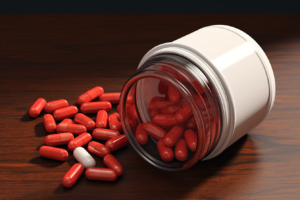Introduction to Creatine Supplementation
Creatine supplementation is a popular dietary supplement used to improve athletic performance, exercise performance, and health benefits. It is a natural compound of creatine and phosphoric acid, and is found in the body’s creatine pool. Creatine may also be found in food sources, but taking a creatine supplement is the most effective way to increase your creatine levels. Research suggests that creatine may be able to improve physical performance, brain health, and resistance training. Studies have also found that creatine supplementation may be able to improve athletic performance, especially during high-intensity exercise.
Creatine supplements may help to improve performance in older adults, as well as people with muscular dystrophy who took creatine every day for 8 weeks. Research indicates that creatine can also boost cognitive benefits, and combining creatine with caffeine may be beneficial. Creatine is generally safe to use, but people should take creatine supplements with caution and be aware of potential adverse effects. The best form of creatine is creatine monohydrate, and people should take at least 3-5 g of creatine per day for the best results. Creatine supplements may help to improve health and performance, and research has concluded that creatine is an effective supplement for athletes.
What is Creatine?
Creatine is a natural substance found in the body that is used to help fuel high-intensity exercise. It is a popular supplement among athletes and bodybuilders, as research has shown that creatine can help boost sports performance. Creatine is a type of organic acid that is made up of three amino acids: arginine, glycine, and methionine. It is found in the muscles, brain, and other organs, and is used to create a molecule called creatine phosphate, which helps to produce energy during high-intensity exercise.

Supplementing with creatine can increase the amount of creatine in the body, which can have a positive effect on sports performance. Studies have shown that creatine can help improve strength, power, and muscle mass, as well as reduce fatigue during exercise. Additionally, creatine has also been shown to improve cognitive function and brain creatine levels.
People who take creatine supplements may also experience other benefits, such as increased muscle mass, improved recovery, and increased energy levels. However, it is important to note that creatine can cause side effects, such as stomach upset, muscle cramps, and dehydration. Therefore, it is important to use creatine supplements responsibly and to consult with a doctor before using creatine.
Benefits of Creatine Supplementation
Creatine supplementation has become increasingly popular among athletes and bodybuilders. Supplementing with creatine can help to increase muscle mass, strength, and power. Research has shown that creatine use can also improve exercise performance and reduce fatigue. Creatine is one of the most studied supplements, and the efficacy of creatine supplementation has been well-documented.
Creatine is an organic acid that is found naturally in the body. It is also found in some foods, such as red meat and fish. People take creatine supplements to increase their levels of creatine in the body. Creatine supplements can increase muscle mass, strength, and power. Creatine may also improve exercise performance and reduce fatigue. Different forms of creatine, such as creatine monohydrate and creatine nitrate, are available. It is recommended to take creatine monohydrate for at least six weeks to get the full benefits of creatine supplementation. Taking caffeine and creatine together may also enhance the effect of creatine supplementation. Creatine supplementation during resistance training can also increase muscle mass and strength. Creatine has the potential to boost performance and reduce fatigue. Supplements like creatine, coenzyme Q10, and beta-alanine may also provide additional benefits. However, creatine may cause side effects such as stomach upset and muscle cramps. Therefore, it is important to consult a doctor before taking any supplements.
Health Benefits of Creatine
Wow, creatine sure has a lot of benefits! Research on creatine has shown that it can boost energy levels, improve muscle strength and even help with brain function. It’s no wonder that the use of creatine supplements has become so popular.The benefits of creatine supplements are numerous. When you take creatine, it helps to increase your body’s high levels of creatine phosphate, which is an organic acid found in the body. Creatine supplementation increases the amount of energy available to your muscles, allowing you to work out longer and harder. It also helps to reduce fatigue and improve recovery time. Plus, studies have shown that coenzyme Q10 and creatine can help to improve brain function.
Creatine has many amazing benefits, and it’s no wonder that so many people are turning to it for help with their health and fitness goals.
Effects of Creatine on Exercise Performance
Creatine is an organic acid found naturally in the body, and it has many benefits when it comes to exercise performance. Supplementation of creatine can boost your energy levels and help you take your workouts to the next level. Studies have shown that creatine can help improve your strength, power, and muscle mass. It can also help you recover faster after a workout, allowing you to get back to your routine sooner.

Creatine is a great way to get an edge in your workouts. It can help you push yourself harder and longer, and it can help you reach your goals faster. Plus, it’s safe and easy to take, so you don’t have to worry about any negative side effects. So if you’re looking for a way to get the most out of your workouts, creatine is definitely worth considering.
How Much Creatine Should You Take?
When it comes to creatine, it’s important to know how much you should take. Creatine has many benefits, and it’s found naturally in the body. But if you’re looking to supplement your diet with creatine, it’s important to know how much you should take.
When it comes to creatine, it’s best to start small and work your way up. Start with a low dose of about 5 grams per day and gradually increase it to 10-20 grams per day. This will help you to get the most out of the creatine benefits without overdoing it. Remember, too much of a good thing can be bad, so make sure you don’t take more than you need.
Sources of Creatine
Creatine is a naturally occurring compound found in the body and is essential for muscle growth and energy production. You can take creatine in the form of a supplement to increase your muscle mass and strength. It’s one of the most popular supplements on the market, and for good reason. Creatine is found in foods like red meat and fish, but you can also take it in the form of a pill or powder. Taking creatine can help you build muscle faster and increase your energy levels.
When you take creatine, it helps your body produce more energy and build muscle faster. It also helps your muscles recover faster after a workout, so you can get back to the gym sooner. Plus, it can help you increase your strength and power, so you can lift heavier weights and get better results. Creatine is a great supplement for anyone looking to get stronger and build muscle. So if you’re looking to take your workouts to the next level, creatine is definitely worth considering.
Potential Benefits of Creatine Supplementation
Creatine supplementation has become increasingly popular in recent years, and for good reason. Taking creatine can provide a number of potential benefits, from improved physical performance to better cognitive functioning.

For starters, creatine can help you take your workouts to the next level. It can increase your strength and power output, allowing you to lift heavier weights and push yourself harder during your workouts. It can also help you recover faster, so you can get back in the gym sooner and keep making progress. Plus, it can help you build lean muscle mass, so you can get the physique you’ve always wanted.Creatine can also help you stay sharp mentally.
It can improve your focus and concentration, so you can stay on task and get more done. It can also help you stay alert and energized, so you can stay productive throughout the day. Plus, it can help you stay motivated and inspired, so you can stay on track and reach your goals. All in all, creatine is a great supplement to take if you want to get the most out of your workouts and your life.
Conclusion
Creatine is a naturally occurring compound found in the body and is also available as a dietary supplement. It is used to increase muscle mass, strength, and power. Creatine is one of the most popular and widely studied supplements available. It is generally safe and well-tolerated when taken in recommended doses. Creatine has been shown to be effective in improving physical performance in activities that require short bursts of energy, such as sprinting and weightlifting. It may also help improve cognitive performance and reduce fatigue. The amount of creatine you take will depend on your goals and the type of activity you are doing. Generally, it is recommended to take 3-5 grams of creatine per day, split into two or three doses. It is important to note that creatine should be taken with food and plenty of water to ensure proper absorption. Creatine is a safe and effective supplement that can help improve physical and cognitive performance. It is important to follow the recommended dosage and take it with food and water to ensure optimal absorption.

FAQ’s:
Q1. What are the benefits of taking creatine?
A1. Taking creatine can provide a range of benefits, including increased muscle mass, improved strength and power, enhanced endurance, and improved recovery.
Q2. How much creatine should you take?
A2. The recommended dosage of creatine is typically 3-5 grams per day, taken with a meal or snack.
Q3. What are the side effects of taking creatine?
A3. The most common side effects of taking creatine are weight gain, dehydration, and gastrointestinal discomfort.
Q4. Is creatine safe to take?
A4. Yes, creatine is generally considered safe to take when taken in the recommended dosage.
Q5. What are the long-term effects of taking creatine?
A5. Long-term effects of taking creatine may include improved muscle mass, increased strength and power, enhanced endurance, and improved recovery.
Q6. Does creatine help with muscle growth?
A6. Yes, creatine can help with muscle growth by increasing the body’s ability to produce energy during exercise, which can lead to increased muscle mass.
Q7. Does creatine help with weight loss?
A7. While creatine may not directly help with weight loss, it can help with muscle growth, which can lead to an increase in metabolism and potentially help with weight loss.



 Creatine As A Dietary Supplement
Creatine As A Dietary Supplement
